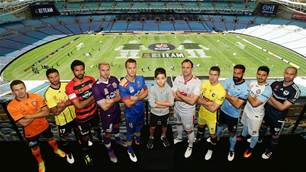Halfway through last year the ABC, at long last, released a box set of "The Games, Series One and Two". In the PR maelstrom, Inside Sport was offered an interview with one of the series’ writers and on-screen stars, John Clarke.
After taking roughly as long to decide as needed to run a 94m Olympic sprint final, we jumped at the chance; the results of our chat appeared in our magazine’s August 2016 edition.
Clarke shared the story with this in-awe writer of how, in the lead-up to Sydney 2000, he was contacted by a journalist from a major American newspaper seeking to find out what it was like organising an Olympic Games while being filmed, fly-on-the-wall style.
“Somebody, I think at The Wall Street Journal, saw the program on television and said, ‘This is rather remarkable; there’s actually a documentary program about the organising of the Olympic Games,” Clarke shared. “They rang us up and I was interviewed; I didn’t reveal at any point that I wasn’t organising the Olympics …
“The story actually appeared in the paper over there and mentioned an interview with the people organising the Olympics, which was a wonderful result for us! Until word got around, people who didn’t have an irony gene might’ve thought it was real.”

New Zealand-born Clarke was one of Australia’s sharpest political satirists. Since 1989 he had worked with partner-in-crime Bryan Dawe in producing mock five-minute interviews which sent watchers of current affairs programs into the weekend with a sly giggle. No matter who Dawe – as himself – was interviewing, Clarke always played the part of the politician or head of state or corporate superpower while looking and sounding just like … Clarke. It was gold. Every time.
Clarke, a veteran television actor, writer, film star and screenwriter, along with fellow writer Ross Stevenson, carried this method into The Games, which was filmed across 1998-2000 documentary-style.
“One of the things that was nice about making the series was we had very good casts,” Clarke told Inside Sport last August. “We had the central characters who were played by Gina Riley, Bryan Dawe, the wonderful Nicholas Bell and me. We had three or four guest people in each episode, too, and they were all fantastic. We really wanted them to perform in a way that wasn’t too ‘actory’. We tried to use people’s own names, let them be themselves: do the lines, but be yourself. We wanted it to look real.”
The Games was an out-of-control ratings success for the ABC. During our chat, Clarke offered very clear reasons for this, which actually had little to do with sport or with wanting to poke fun at a group of Australians trying to organise the biggest sports carnival in the world. “In part, we were writing a show that was about television,” said Clarke.

“We were mixing genres up: it was shot as a documentary, played as a drama and written as a satire. We wanted the audience to be able to decide what it thought was funny and true and real and well-observed and silly and any of the other categories in life.”
Perhaps the most lasting images of The Games were the mishaps which featured throughout, with officials having to determine whether tickets to the 2000 Olympic Games were being printed too small … or if the machines they’d be going into were too big. Then there was that 94m running track in the main Olympic Stadium.
Clarke said there were plenty of other ideas which ended up on the cutting-room floor. “I wrote something else, but we couldn’t find a place for it. We had worked out there was something wrong with the swimming pool; if you swam in lanes four and five, your times were always quicker.
“Maybe the water in those two lanes was the beneficiary of some sort of physics that was going on in relation to the side walls. We [the show’s characters] didn’t quite know why it was happening. Of course, the real reason it was happening was the people with the fastest times were being put in lanes four and five … ”
RIP John Clarke. What a legend.
(Header image: left to right - Bryan Dawe, Gina Riley and John Clarke. Image courtesy ABC).
Related Articles

How are A-League clubs funded? Not an easy question…

ABC defends Grand Final snub after dismal finals ratings



.png&h=115&w=225&c=1&s=1)









